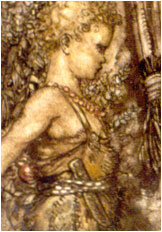|
THE LOVE PANACEA
We shall now find that at the point where The Ring changes from
music drama into opera, it also ceases to be philosophic, and
becomes didactic. The philosophic part is a dramatic symbol of
the world as Wagner observed it. In the didactic part the
philosophy degenerates into the prescription of a romantic
nostrum for all human ills. Wagner, only mortal after all,
succumbed to the panacea mania when his philosophy was exhausted,
like any of the rest of us.
The panacea is by no means an original one. Wagner was
anticipated in the year 1819 by a young country gentleman from
Sussex named Shelley, in a work of extraordinary artistic power
and splendor. Prometheus Unbound is an English attempt at a Ring;
and when it is taken into account that the author was only 27
whereas Wagner was 40 when he completed the poem of The Ring, our
vulgar patriotism may find an envious satisfaction in insisting
upon the comparison. Both works set forth the same conflict
between humanity and its gods and governments, issuing in the
redemption of man from their tyranny by the growth of his will
into perfect strength and self-confidence; and both finish by a
lapse into panacea-mongering didacticism by the holding up of
Love as the remedy for all evils and the solvent of all social
difficulties.
The differences between Prometheus Unbound and The Ring are as
interesting as the likenesses. Shelley, caught in the pugnacity
of his youth and the first impetuosity of his prodigious artistic
power by the first fierce attack of the New Reformation, gave no
quarter to the antagonist of his hero. His Wotan, whom he calls
Jupiter, is the almighty fiend into whom the Englishman's God had
degenerated during two centuries of ignorant Bible worship and
shameless commercialism. He is Alberic, Fafnir Loki and the
ambitious side of Wotan all rolled into one melodramatic demon
who is finally torn from his throne and hurled shrieking into the
abyss by a spirit representing that conception of Eternal Law
which has been replaced since by the conception of Evolution.
Wagner, an older, more experienced man than the Shelley of 1819,
understood Wotan and pardoned him, separating him tenderly from
all the compromising alliances to which Shelley fiercely held
him; making the truth and heroism which overthrow him the
children of his inmost heart; and representing him as finally
acquiescing in and working for his own supersession and
annihilation. Shelley, in his later works, is seen progressing
towards the same tolerance, justice, and humility of spirit, as
he advanced towards the middle age he never reached. But there is
no progress from Shelley to Wagner as regards the panacea, except
that in Wagner there is a certain shadow of night and death come
on it: nay, even a clear opinion that the supreme good of love is
that it so completely satisfies the desire for life, that after
it the Will to Live ceases to trouble us, and we are at last
content to achieve the highest happiness of death.
This reduction of the panacea to absurdity was not forced upon
Shelley, because the love which acts as a universal solvent in
his Prometheus Unbound is a sentiment of affectionate benevolence
which has nothing to do with sexual passion. It might, and in
fact does exist in the absence of any sexual interest whatever.
The words mercy and kindness connote it less ambiguously than the
word love. But Wagner sought always for some point of contact
between his ideas and the physical senses, so that people might
not only think or imagine them in the eighteenth century fashion,
but see them on the stage, hear them from the orchestra, and feel
them through the infection of passionate emotion. Dr. Johnson
kicking the stone to confute Berkeley is not more bent on
common-sense concreteness than Wagner: on all occasions he
insists on the need for sensuous apprehension to give reality to
abstract comprehension, maintaining, in fact, that reality has no
other meaning. Now he could apply this process to poetic love
only by following it back to its alleged origin in sexual
passion, the emotional phenomena of which he has expressed in
music with a frankness and forcible naturalism which would
possibly have scandalized Shelley. The love duet in the first act
of The Valkyries is brought to a point at which the conventions
of our society demand the precipitate fall of the curtain; whilst
the prelude to Tristan and Isolde is such an astonishingly
intense and faithful translation into music of the emotions which
accompany the union of a pair of lovers, that it is questionable
whether the great popularity of this piece at our orchestral
concerts really means that our audiences are entirely catholic in
their respect for life in all itits beneficently creative
functions, or whether they simply enjoy the music without
understanding it.


|










